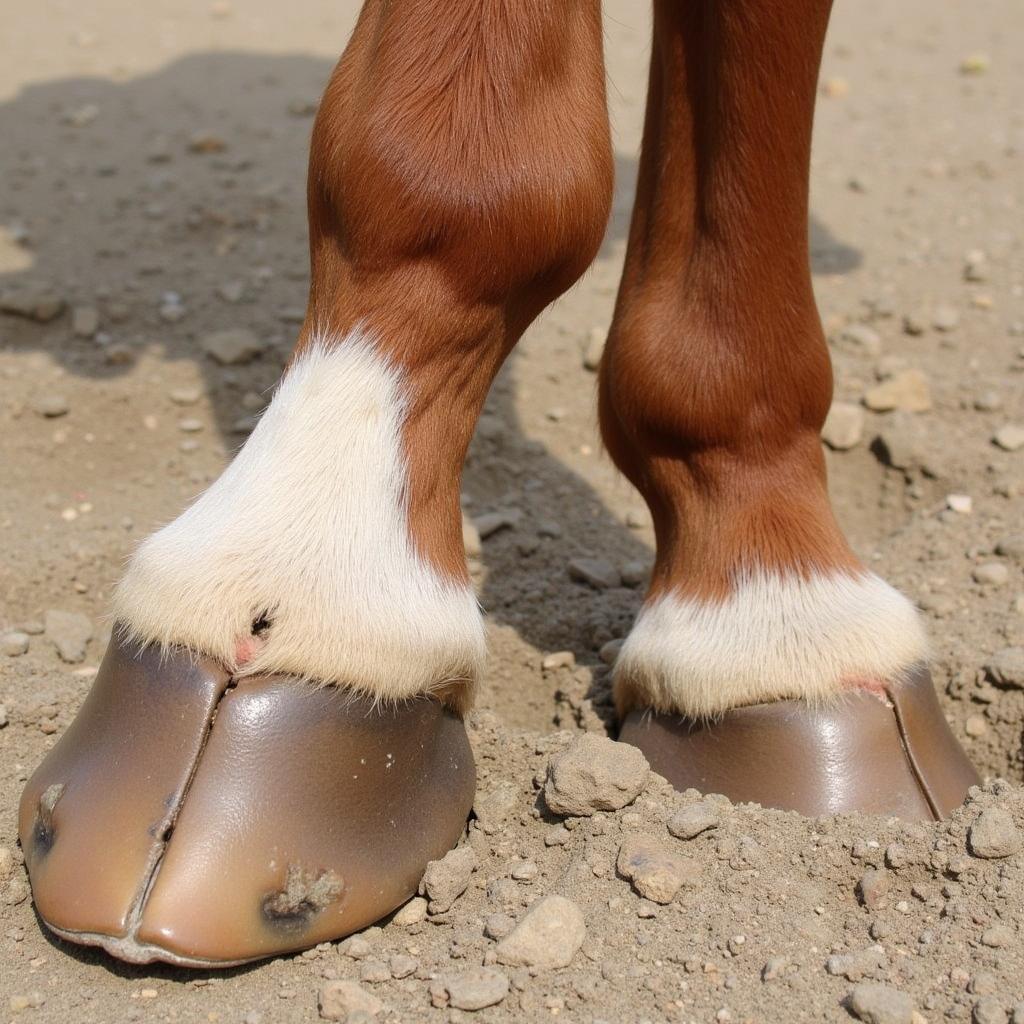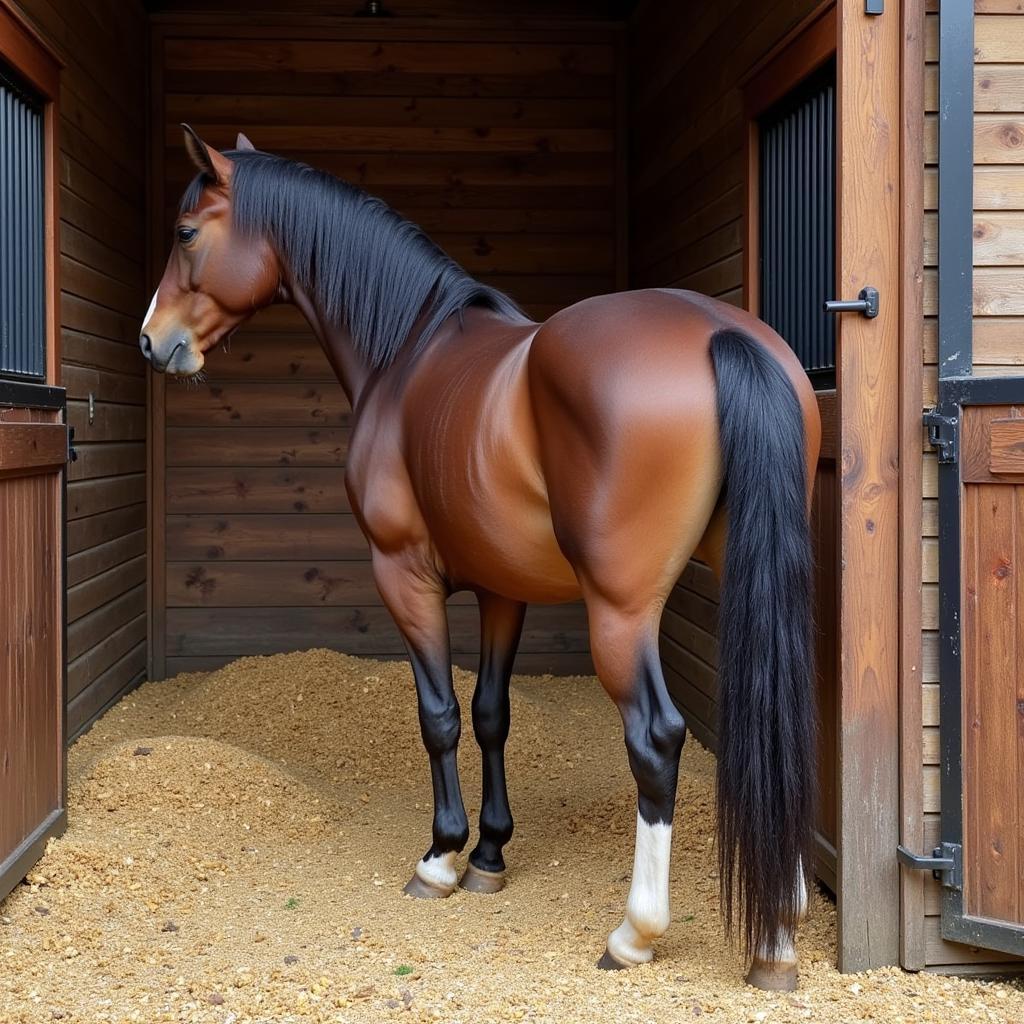Canker in horses is a chronic, progressive disease of the equine hoof, specifically affecting the frog, sole, and bars. It’s characterized by a foul-smelling, grayish-black discharge and abnormal tissue growth, often resembling cauliflower. Understanding this debilitating condition is crucial for every horse owner.
Understanding Horse Canker: Causes and Symptoms
Canker is a frustrating condition for both horse and owner, often requiring long-term management. While the exact cause remains elusive, several factors are suspected to contribute to its development. These include poor stable hygiene, prolonged exposure to moisture, bacterial or fungal infections, and trauma to the hoof. Genetics may also play a role. Early detection is key, so recognizing the symptoms is vital. Look out for a thick, black discharge with a distinctive, unpleasant odor. The affected area often shows a proliferation of abnormal, crumbly tissue. Lameness can vary depending on the severity of the infection.
 Photograph showing the early stages of canker in a horse's hoof.
Photograph showing the early stages of canker in a horse's hoof.
Diagnosing and Treating Canker: A Veterinarian’s Perspective
Diagnosing canker involves a thorough examination of the hoof by a veterinarian. They may take samples of the affected tissue for laboratory analysis to rule out other conditions like thrush or abscesses. Treatment typically involves debridement, or surgical removal, of the diseased tissue. canker treatment in horses This procedure requires careful precision to remove all infected tissue without damaging healthy structures. Topical medications, often containing antimicrobials and astringents, are then applied to control infection and promote healing. Regular follow-up care and meticulous hygiene are crucial for successful treatment.
What are the long-term effects of Canker?
Long-term management of canker involves meticulous hoof care and regular veterinary check-ups. The horse canker prognosis depends on the severity of the initial infection and the horse’s response to treatment. In some cases, the disease can recur, requiring further intervention.
“Early and aggressive treatment offers the best chance for a positive outcome,” advises Dr. Emily Carter, DVM, specializing in equine podiatry. “Consistent hoof care and a clean environment are crucial for preventing recurrence.”
Prevention: Maintaining Healthy Hooves
Preventing canker revolves around maintaining a clean, dry environment for your horse. Regularly clean your horse’s hooves, paying close attention to the frog and surrounding areas. Ensure adequate ventilation in stalls and avoid prolonged exposure to wet or muddy conditions. canker horse foot Regular farrier visits are also essential to maintain proper hoof balance and address any underlying issues that could predispose your horse to canker.
 A clean, dry horse stall with good ventilation, demonstrating best practices for canker prevention.
A clean, dry horse stall with good ventilation, demonstrating best practices for canker prevention.
Conclusion: Protecting Your Horse from Canker
Canker in horses is a challenging condition requiring diligent management and veterinary care. Understanding the causes, symptoms, and preventive measures is crucial for every horse owner. By prioritizing hoof health and maintaining a clean environment, you can significantly reduce your horse’s risk of developing this debilitating disease. Remember, early detection and intervention are key to successful treatment and a positive outcome. Don’t hesitate to contact your veterinarian if you suspect your horse may have canker.
FAQ
- Is canker contagious? While not directly contagious between horses, the predisposing factors like poor hygiene can create an environment where the condition is more likely to develop.
- Can canker be cured completely? With diligent treatment and management, canker can be controlled and often resolved, although recurrence is possible.
- What is the typical treatment duration for canker? Treatment duration varies depending on the severity and can range from several weeks to months.
- How can I tell the difference between canker and thrush? While both affect the hoof, canker typically involves more extensive tissue proliferation and a distinctive foul odor. A veterinarian can definitively diagnose the condition.
- Is canker painful for horses? Canker can cause varying degrees of discomfort and lameness, depending on the severity of the infection.
- What should I do if I suspect my horse has canker? Contact your veterinarian immediately for a proper diagnosis and treatment plan. immediate response for horses
- Are certain breeds of horses more susceptible to canker? While any horse can develop canker, draft breeds and horses with white hooves are sometimes thought to be more predisposed.
Related Resources
For more information on equine housing options, check out our classic equine horse stalls.
Need help with your horse’s canker? Contact us at Phone Number: 0772127271, Email: [email protected] or visit us at QGM2+WX2, Vị Trung, Vị Thuỷ, Hậu Giang, Việt Nam. We have a 24/7 customer service team.